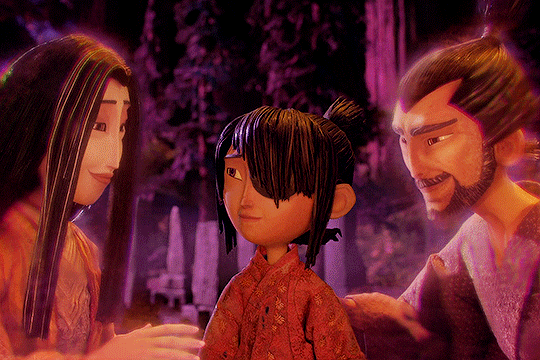"If you must blink, do it now..." so begins the epic tale that is Kubo and the Two Strings. Over the course of its one hour forty minute run time viewers will be hard pressed to look away from this visual and storytelling marvel, even to blink. This 2016 animated adventure marks some of Laika studios' most moving and dazzling work to date and showcases stop-motion animation at its most vibrant. For an adventure that the entire family won't be able to take their eyes off of strum along with Kubo and the Two Strings.
The story begins in feudal Japan with Sariatu attempting to escape the supernatural wrath of her tyrannical father, the Moon King. After a visually stunning battle in which she suffers a head injury, Sariatu and her infant son, Kubo, narrowly escape. Years later, Kubo cares for his mother, whose trauma has left her catatonic during the day and suffering increasing memory loss. In order to support himself and his ailing mother he works as a street performer, entertaining crowds with his magical shamisen and regaling them with the tales that his mother tells to him each night. Before he can finish his stories he must return home each night by nightfall, when the Moon King is at his most powerful. During the annual Obon festival Kubo pays tribute to and attempts to communicate with his deceased father, legendary samurai Hanzo. Before he can make contact with his father's spirit, however, the sun sets and he is ambushed by his two witchlike aunts Karasu and Washi. His mother arrives just in time to rescue him, but gives her life in the process. He then finds himself on a journey to complete his father's quest, avenge his parents, and finally defeat the Moon King.
Kubo and the Two Strings combines tradition and innovation to relate an epic tale that is at once universal and unique. Through its portrayal of Kubo's quest the film depicts the time honored hero's journey to tell a coming of age story that young viewers will continue to draw lessons from as they grow older. The film explores such mature themes as life, death, memory, and what it means to be human in a way that will resonate with parents and older children alike. Simultaneously, the film offers plenty of action, adventure, and humor to ensure that younger children will be entertained. The film draws upon Japanese mythology to create a sense of authenticity and combines it with standard fairytale conventions to create an experience that is at once comfortingly familiar and entirely original. Perhaps the film's greatest strength lies in its refusal to talk down to its young audiences. The film thankfully avoids the formulaic plot, forced moral messaging, and low brow humor that family entertainment is too often relegated to. Instead, the film provides a more mature movie going experience that acknowledges such harsh truths as the existence of evil and the inevitability of death. In this way the film offers vital insight that will help young viewers cope with grief and trauma. Similarly, the film's deeper questions will keep young viewers returning for more as they grow up alongside Kubo. Hit the road with Kubo and the Two Strings for the adventure that is nothing short of cinema magic.
The film transports viewers to feudal Japan thanks to its sweeping score, engaging voice performances, and brilliant animation. The voice performances ensure that audiences will empathize with Kubo, Monkey, and Beetle and root for them along every step of their fantastic journey. Roomey Mara is nothing short of haunting as Sariatu's wicked sisters, Karasu and Washi. Ralph Fiennes makes for a cunning, manipulative, and larger than life villain as Matthew Mcconaughey imbues Beetle with his signature charm and steals each scene in which he appears. Charlize Theron particularly shines in her dual roles as Kubo's warm and courageous mother, Sariatu, and his no-nonsense sardonic mentor, Monkey. Art Parkinson more than holds his own amongst the star-studded cast as he turns in a performance that balances humor, innocence, and raw emotion in a way that could eclipse many live action performances. The film's score makes ample use of its setting by utilizing authentic Japanese instruments to maximum thematic effect. Even as its script and performances take viewers on an unforgettable adventure the film's greatest strength remains its dazzling animation. The film's lush setting, expressive characters, and thrilling action sequences showcase stop motion animation at its most breathtaking.
At once a traditional epic and an innovative piece of modern storytelling Kubo and the Two Strings is a is must see viewing for the whole family. Through its thought provoking script the film explores such complex themes as death, rebirth, memory, and the power of storytelling in a way that will resonate with adults. Simultaneously, the film offers plenty of action, humor, and adventure that is sure to satisfy young audiences. The film's voice performances, score, and animation combine to take viewers on a mesmerizing journey through Japanese mythology. For a film that will leave the whole family begging for an encore set out for the adventure of a lifetime with Kubo and the Two Strings.





